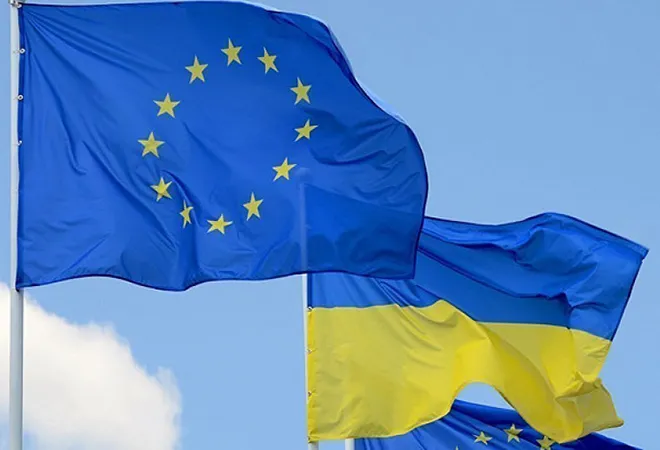-
CENTRES
Progammes & Centres
Location
The diplomatic outreach to Europe by Ukraine was largely aimed at persuading the European allies to extend more support to the cause

In the past 10 days, Europe appeared to be doubling down on its commitment towards Ukraine. The extraordinary visit of the European Council and Commission’s presidents along with 15 Commissioners of the European Union to Kiev for the EU-Ukraine Summit on 3 February 2023 was followed by the Ukrainian President’s visit to first, London on 8 February 2023, where he addressed Parliament and met British Prime Minister Rishi Sunak; second, to Paris where President Zelensky met both French President Macron and German Chancellor Scholz; and finally, to Brussels where he addressed the EU Parliament and attended the EU Summit on 9 February 2023.
These visits come at a time when the Ukrainian conflict is set to cross its one-year mark on 24 February 2023 and with both Moscow and Kiev doubling down on their preparation for the spring offensive. The following are the key takeaways from this diplomatic outreach -
1. Defending the European way of life
This appeared to be the underlying theme of President Zelenskyy’s speech at both the EU Parliament and the Council. President Zelensky exalted the European way of life which is based on respect for freedom, law, and democracy—adding during his speech at the EU Parliament that ‘Europe will always remain free. As long as we are together and as long as we care about our Europe!’. This sentiment was further emphasised by the Ukrainian President at EU Council when he said that ‘A free Europe today cannot be imagined without a free Ukraine’. He also made a reference to the Ukrainian quest for joining the EU pointing out that ‘This is our Europe, these are our rules, this is our way of life. And for Ukraine, it’s a way home, a way to its home’.
President Zelensky exalted the European way of life which is based on respect for freedom, law, and democracy—adding during his speech at the EU Parliament that ‘Europe will always remain free.
Zelensky’s speeches at the EU institutions were largely aimed to ensure a membership of the Bloc and were in hopes to interlink the EU and Ukraine through shared values and history. However, his speech at the British Parliament was a direct request for heavy weaponry, including fighter jets as President Zelensky said ‘We have freedom, give us wings to protect it.’ He also made the case for Russia’s defeat and enhancing UK-Ukraine ties stating that ‘We know Russia will lose...The United Kingdom is marching with us towards the most important victory of our lifetime. The victory over the very idea of war’—thereby emphasising on renewed Western commitments towards Ukraine.
2. No timeline for accession
The issues of Ukrainian accession to the EU loomed large in the agenda of the EU’s leadership visit to Kiev as well as during Zelenskyy’s visit to Paris and Brussels. While the Commission is expected to release its assessment of Ukraine’s progress for its membership later this year, no concrete timeline for the conclusion of the accession process has been provided. During a press conference after the special meeting of the EU Council, Commission President Ursula von der Leyen emphasised that ‘there is no rigid timeline, it is a merit-based process’, pointing out that the speed of implementation of reforms and achievement of milestones as set under the process largely determine the length of the membership process.
While the Ukrainian government has pushed for the opening of membership talks by the end of 2023, there are several concerns including the capacity of the EU to absorb new members, the range of criteria that need to be met before the start of negotiations, and more importantly the membership status of Western Balkan countries which has been stalled because of the enlargement fatigue in many of the member states.
3. European support for Ukraine
‘As long as it takes’ appeared to be the underlying emphasis of the European leadership on the conflict in Ukraine. European Commission President von der Leyen stressed that collectively 67 billion euros have been given in support to Ukraine and refugees. These include financial, humanitarian, emergency, budgetary and military support along with the commitment to provide up to 18 billion euros MFA+ package for short-term EU financial relief financing Ukraine’s immediate needs and rehabilitation of critical infrastructure for 2023. An additional 10 billion euros was provided in support to refugees and the first disbursement of 3 billion euros was contributed to lessen the pressing liquidity needs early in the year.’
A key outcome of the visits included the EU’s support for the 10-point peace plan that was put forward by Ukraine at the G20 Bali Summit of 2022 which includes a document confirming the end of the war; effective security assurances; restoration of Ukraine’s territorial integrity and Russia reaffirming it according to the UN Charter; complete withdrawal of Russian troops; special tribunal for the prosecution of Russian war crimes. The European Council reiterated the EU’s readiness to support Ukraine’s initiative for a just peace based on respect for Ukraine’s sovereignty and territorial integrity and reaffirmed reaffirms its commitment to work actively with Ukraine on the 10-point peace plan. It further added that the EU supported the idea of a Peace Formula Summit and will work with Ukraine towards wider possible international participation.
The European Council reiterated the EU’s readiness to support Ukraine’s initiative for a just peace based on respect for Ukraine’s sovereignty and territorial integrity and reaffirmed reaffirms its commitment to work actively with Ukraine on the 10-point peace plan.
The implementation of the 10th round of sanctions was also discussed during the meetings with Kiev making a case for increasing the spectrum of sanctions to include the nuclear sector. The EU is working towards new rounds of sanctions which are to be ready by 24 February 2023. However, a critical issue that the member states agreed on was to step-up its discussion and to work towards the use of Russia's frozen assets to support Ukraine’s reconstruction and for the purposes of reparation, in accordance with EU and international law. While this step has been pushed by Baltic countries and Poland, the proposal remains contentious due to the lack of any legal precedent or framework.
4. More defence pledges
Zelenskyy’s visit was aimed at pressing his European allies to support and speed up the armament delivery to Ukraine. In Britain, he was able to secure commitment to train Ukrainian pilots on advanced NATO fighter jets and long-range missiles. However, on the issue of providing fighter planes, British Prime Minister Rishi Sunak said ‘nothing is off the table’ adding that the priority must be to ‘arm Ukraine in the short-term’ so that the country is not vulnerable to Russian offensive. Similarly, President Macron emphasised that France will work with Ukraine towards ‘victory, peace and Europe’ and would ‘continue the efforts to deliver arms to Kyiv’. France, in January 2023, had committed to providing 12 more Caesar truck-mounted howitzers and air defense equipment to bolster Ukrainian defence. Also regarding sending of fighter planes, the French defence minister had earlier said that it was not a ‘taboo’. Although the European allies have agreed to provide the Ukrainian military with Leopard tanks and other equipment, there is reluctance to provide the fighter planes. This is partly due to their concerns regarding accidental strikes inside Russia which could lead to an escalation of war through miscalculation.
President Macron emphasised that France will work with Ukraine towards ‘victory, peace and Europe’ and would ‘continue the efforts to deliver arms to Kyiv’.
At the EU level, Council President Charles Michel also doubled down on the promise of ‘maximum support both politically and militarily’. The EU on 2 February 2023 approved a seventh tranche of €500 million in military support to Ukraine under the European Peace Facility bringing the total EU contribution under the EPF for Ukraine to 3.6 billion euros. In addition, it also approved a new 45 million euros assistance measure supporting the training efforts of the European Union Military Assistance Mission in support of Ukraine (EUMAM Ukraine).
Conclusion
In short, the diplomatic outreach to Europe was largely aimed at persuading the European allies to provide weapons and larger military assistance to support the Ukrainian military to counter the expected Russian spring offensive. Along with this, Zelensky renewed the call for expediting the process of Ukraine’s membership to the Union. So far, while the US and the UK have been the largest supplier of military equipment to Kiev, the EU has emerged to be the largest provider of financial and humanitarian assistance to the country; along with providing military aid under its European Peace Facility. For Kiev, this visit might not have led to any major declaration of military aid, but it bought positive signals from its European allies that nothing is off the table for supporting Ukraine. For Europe, the diplomatic outreach of Kiev provided an opportunity to re-commit themselves ‘for as long as it takes’ in the conflict situation. While the fighter jets and EU accession were high on the agenda, both appear to be long-term objectives for now.
The views expressed above belong to the author(s). ORF research and analyses now available on Telegram! Click here to access our curated content — blogs, longforms and interviews.

Ankita Dutta was a Fellow with ORFs Strategic Studies Programme. Her research interests include European affairs and politics European Union and affairs Indian foreign policy ...
Read More +